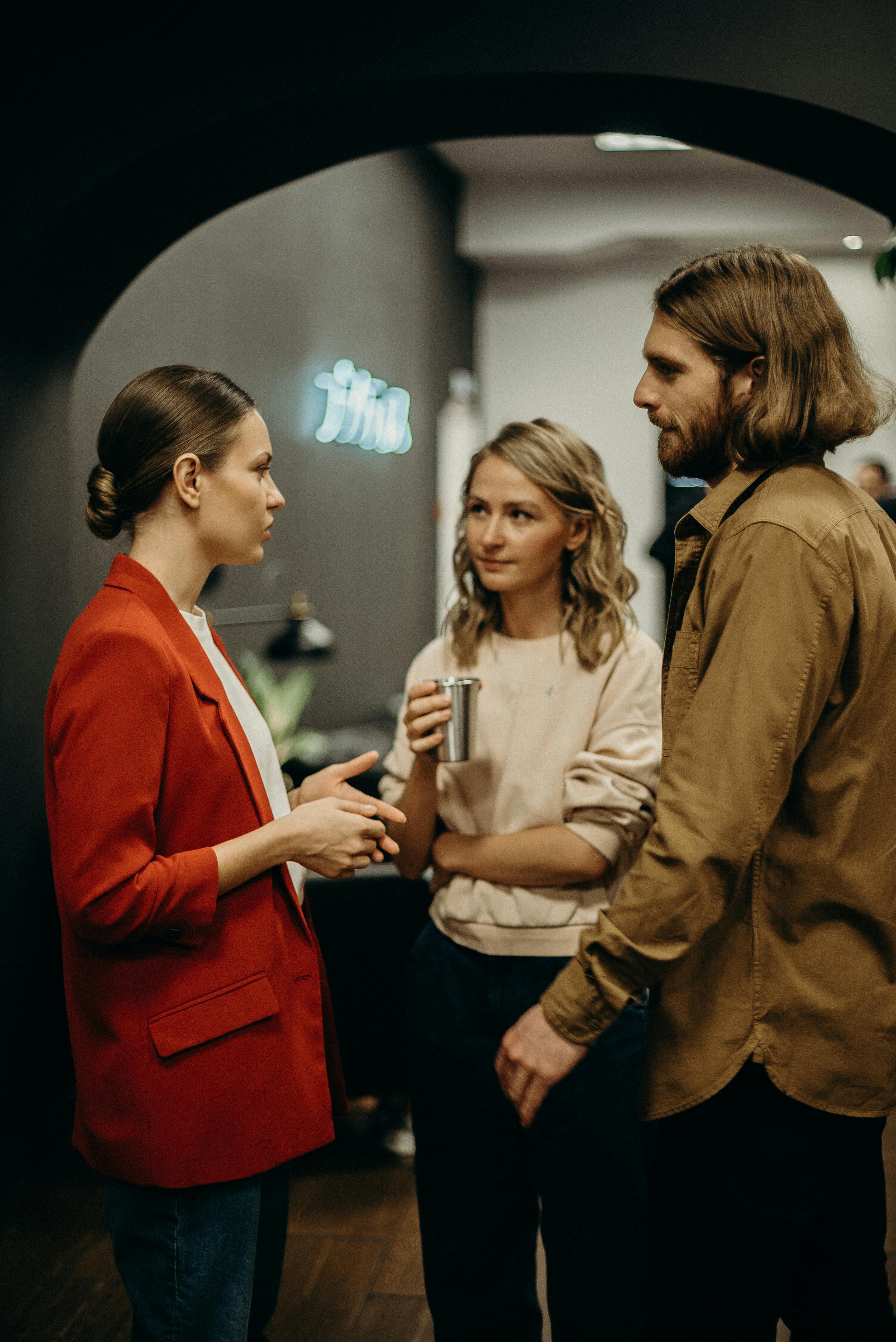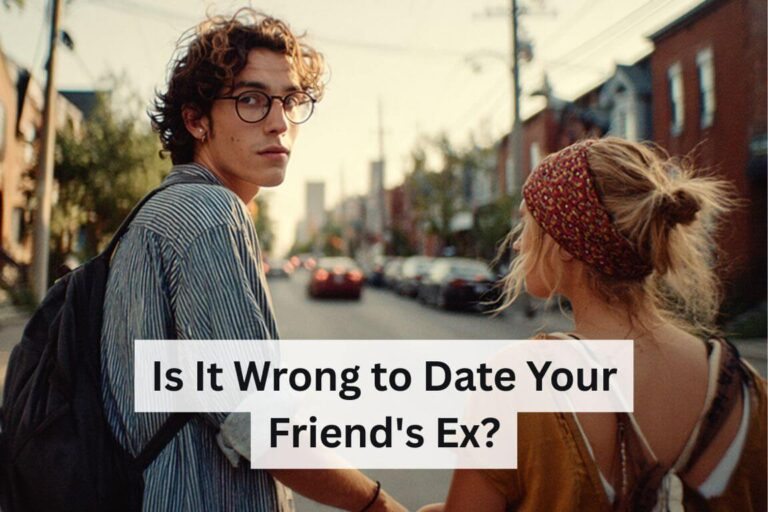The heart wants what the heart wants, even when it leads us into complicated territory.
If you find yourself catching feelings for someone who used to hold a special place in your friend’s life, you’re facing one of the most delicate situations in modern romance.
While there’s no universal answer to whether it’s right or wrong, there are thoughtful ways to navigate these murky waters without losing yourself or the people who matter most.
When Friendship Rules Collide with Matters of the Heart
Friendship codes exist for good reason. They protect bonds that have weathered countless storms, late-night conversations, and shared memories that stretch back years.
The unwritten rule about steering clear of a friend’s romantic past isn’t just about jealousy or possession.
It’s about respect, loyalty, and preserving the sacred space that friendships occupy in our lives.
Yet love rarely follows the rulebook. Sometimes chemistry sparks in unexpected places, and genuine connections develop in ways we never anticipated.
The key isn’t to judge yourself for having feelings, but to approach the situation with intentional thoughtfulness rather than impulsive action.
Your emotions are valid, but so are the potential consequences of acting on them.
Understanding why this particular taboo exists can help you make more informed decisions. When someone dates within a friend group, it changes the entire dynamic.
It can create awkward social situations, force friends to choose sides, and sometimes destroy relationships that took years to build.
These aren’t abstract possibilities, they’re real outcomes that many women have experienced firsthand.

Examining Your True Motivations
Before moving forward, it’s crucial to take an honest look at what’s driving your interest. Are you genuinely drawn to this person for who they are, or could there be other factors at play?
Sometimes what feels like authentic attraction might actually be curiosity about what your friend saw in them, or even unconscious competition.
Ask yourself these hard questions: Is this person truly special to you, or do they represent something else, perhaps validation, excitement, or a way to feel closer to your friend’s experiences?
Are you seeking something that’s currently missing in your romantic life, and could that void be filled by someone who doesn’t come with complicated history?
Consider whether your interest might be heightened by the forbidden nature of the situation.
Sometimes the thrill of crossing boundaries can feel intoxicating, but it’s important to separate genuine compatibility from the rush of doing something that feels rebellious.
The excitement of secrecy and drama can masquerade as deep connection, but it rarely sustains a healthy relationship.
Also examine the timeline carefully. If you’ve harbored feelings for this person while they were with your friend, that adds another layer of complexity.
It might indicate that your connection runs deeper than casual interest, but it could also suggest that you’ve been emotionally investing in someone who wasn’t available, which isn’t entirely fair to anyone involved.
Timing Matters More Than You Think
The question of when can be just as important as whether. If the breakup happened recently, emotions are still raw, and wounds haven’t had time to heal.
Dating someone’s ex immediately after their split can look calculating, even if your feelings developed naturally over time.
Fresh breakups require patience. Even if your friend claims they’re “totally over it,” processing the end of a meaningful relationship takes time.
Rushing into something new while your friend is still working through their emotions shows a lack of consideration for their healing process.
It can also make it seem like you were waiting in the wings, which damages trust regardless of your actual intentions.
Consider how serious their relationship was. A casual fling from months ago carries different weight than a long-term partnership that ended recently.
The depth of their connection, the reasons for their breakup, and how much emotional investment was involved should all factor into your decision-making process.
Sometimes waiting isn’t just about respecting your friend’s feelings. It’s about protecting yourself too.
Jumping into a relationship while emotions are still complicated can set you up for unnecessary drama and pain.
Give everyone time to gain perspective and clarity about what they really want.
Having the Difficult Conversation
If you’ve decided that your feelings are genuine and the situation might be worth exploring, honest communication becomes essential.
The conversation you have with your friend will likely determine whether your relationships can survive this situation. Approach it with empathy, authenticity, and genuine concern for their feelings.
Don’t ambush them with this information. Choose a time when you can talk privately and without distractions.
Begin by acknowledging how awkward the situation is and expressing that you value their friendship.
Be direct about your feelings while also making it clear that their comfort and your friendship matter to you.
Listen carefully to their response. Pay attention not just to their words, but to their body language and emotional reactions.
Some people will say they’re fine when they’re not, either because they want to appear mature or because they haven’t processed their own feelings yet. Give them space to be honest, even if that honesty is difficult to hear.
Respect whatever boundaries they set, even if those boundaries mean you can’t pursue this relationship.
Your friend didn’t choose to have their ex become romantically available to their close friends, and they shouldn’t be pressured to be comfortable with something that genuinely bothers them.

Reading Between the Lines
Your friend’s reaction will tell you a lot about how to proceed, but it’s important to look beyond their immediate response.
Someone might give their blessing in the moment but feel differently as the reality sets in. Watch for signs of discomfort, withdrawal, or changes in how they interact with you.
If they seem genuinely supportive, that’s encouraging, but it doesn’t mean the path ahead will be smooth.
Even the most understanding friends might struggle with actually seeing you together, hearing about your relationship, or navigating social situations where all parties are present.
Pay attention to mutual friends’ reactions too. Sometimes the person directly involved handles the situation better than the broader friend group does.
Social dynamics can shift in unexpected ways, and you might find yourself dealing with judgment or awkwardness from people you didn’t anticipate.
Consider whether your friend might be saying yes because they feel pressured to appear mature or worry about losing your friendship if they object.
True consent in these situations means they feel genuinely comfortable, not just resigned to something they can’t change.
Protecting Yourself from Rebound Relationships
One risk that’s often overlooked is the possibility that this person isn’t emotionally available for a new relationship, regardless of how much time has passed.
People process breakups differently, and some jump into new connections as a way to avoid dealing with their feelings about the previous relationship.
Be honest about what you observe. Do they talk about your friend frequently? Do they seem to compare you to their ex, either favorably or unfavorably?
Are they genuinely excited about getting to know you as an individual, or does their interest seem tied to your connection to your friend?
Watch for signs that you might be a transitional relationship, someone who helps them move on rather than someone they’re truly invested in long-term.
This isn’t necessarily malicious; many people don’t realize they’re not ready for something new. But recognizing these patterns early can save you from heartbreak down the road.
Consider whether their interest in you might be connected to unresolved feelings about your friend.
Sometimes people are drawn to those close to their exes as a way to maintain some connection to their past relationship, even unconsciously. This dynamic rarely leads to healthy, sustainable partnerships.
When the Risk Might Be Worth Taking
Despite all these considerations, sometimes the connection is genuinely special enough to justify the complications.
Authentic love is rare, and if you’ve found something that feels truly meaningful, it might be worth fighting for, carefully and respectfully.
Look for signs that this could be more than a fleeting attraction. Do you have deep compatibility beyond physical chemistry? Do you share similar values, life goals, and ways of communicating? Can you envision a future together that goes beyond the excitement of the current moment?
Consider whether both of you are willing to handle the situation maturely. Are they committed to being transparent with mutual friends? Are they willing to give your friend space when needed? Do they understand the delicate nature of the situation and take it seriously?
Strong relationships can weather external pressure, but they require both parties to be fully invested in making things work.
If one of you is ambivalent or sees the drama as part of the appeal rather than an obstacle to overcome, the relationship is unlikely to survive the challenges ahead.
Navigating Social Situations Gracefully
If you decide to move forward, developing strategies for social navigation becomes crucial.
You’ll likely encounter situations where you, your friend, and your partner are all present, and handling these moments with grace requires advance planning and clear boundaries.
Discuss with your partner how you’ll handle group gatherings. Will you maintain some distance in public settings to avoid making your friend uncomfortable?
How will you deal with well-meaning but awkward comments from mutual friends? Having these conversations beforehand prevents you from making decisions in emotionally charged moments.
Be prepared for some relationships to change or end entirely. Not everyone will understand your choice, and some people might feel they need to choose sides.
This doesn’t necessarily reflect poorly on you. It’s often just the reality of complex social situations where emotions run high.
Consider whether there are ways to minimize awkwardness while still maintaining your relationships.
This might mean being selective about which social events you attend together, or finding ways to maintain separate connections with mutual friends when possible.

Building Something New from Complicated Beginnings
Relationships that start under complicated circumstances face unique challenges, but they can also develop unusual strength if both parties are committed to handling things thoughtfully.
The key is acknowledging the complexity rather than pretending it doesn’t exist or hoping it will resolve itself over time.
Be prepared for your relationship to face extra scrutiny from others. People might watch for signs that it won’t work out, or judge your compatibility based on factors beyond your actual connection.
Developing thick skin and focusing on what matters between the two of you becomes essential for long-term success.
Remember that your relationship’s origin story will always be part of its narrative. Instead of seeing this as a burden, consider how you can honor the complexity while building something uniquely your own.
Some couples find that working through these early challenges actually strengthens their communication and commitment to each other.
Making Peace with Your Decision
Whether you choose to pursue this relationship or step back, making peace with your decision is essential for your emotional well-being.
Both paths come with potential regrets: the regret of losing a friend or the regret of passing up a potentially meaningful connection.
If you decide not to pursue the relationship, find healthy ways to process your feelings. Don’t martyr yourself or hold onto resentment about “sacrificing” for friendship.
Instead, view it as a choice that aligns with your values and priorities. Sometimes loving someone means letting them go, even when they might have been available to you.
If you choose to move forward, do so with full commitment rather than half-hearted testing of the waters. Lukewarm pursuit causes maximum drama with minimal potential for meaningful connection.
Be prepared to invest emotionally while also accepting that things might not work out despite your best efforts.
Learning from Whatever Unfolds
Regardless of which path you choose, these situations offer valuable insights about your values, your friendship dynamics, and what you truly want in relationships.
Pay attention to what you learn about yourself through this process, including how you handle difficult conversations, navigate competing loyalties, and make decisions under pressure.
Notice whether you tend to prioritize romantic possibilities over friendships, or if you consistently put others’ comfort ahead of your own desires.
Both patterns can be problematic if taken to extremes, and awareness helps you make more balanced choices in the future.
Consider how this experience might inform your approach to similar situations down the road.
The lessons you learn now, about communication, timing, and emotional intelligence, will serve you well in future relationships, whether romantic or platonic.
Remember that growth often comes from navigating difficult situations with integrity rather than avoiding them entirely.
The fact that you’re wrestling with these questions thoughtfully suggests you care about doing right by everyone involved, including yourself. That intention matters, even if the outcome isn’t perfect.
Most importantly, trust that authentic connections are worth the effort they require to pursue ethically.
Love that asks you to be more thoughtful, more communicative, and more considerate of others’ feelings isn’t necessarily more complicated than it needs to be. It might just be more mature than relationships that exist in simpler circumstances.
The heart’s desires don’t always align with social conventions, but that doesn’t make them wrong.
Sometimes the most meaningful relationships are the ones that require us to grow, communicate better, and love more thoughtfully.
The question isn’t whether it’s wrong to date your friend’s ex. It’s whether you can do it in a way that honors everyone involved, including yourself.


